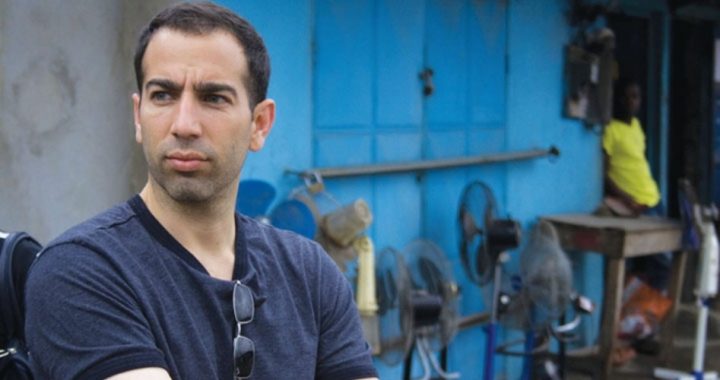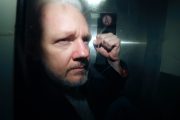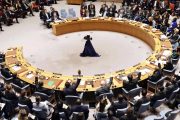
How does an urbane New Yorker, who lives in an area that is almost synonymous with liberal ideology, come to make a movie about the flaws of the United Nations — an organization that is almost universally revered by liberals as the example by which the world can become more civilized? We asked Ami Horowitz (pictured), who is the producer of the popular documentary U.N. Me. His film effectively exposes just a few of the deep-seated problems within the UN, such as the Oil for Food shakedown, the deception within the International Atomic Energy Agency, the “peacekeeping” debacle in Cote d’Ivoire, and the UN’s refusal to act to stop the Darfur genocide, among others.
The New American, which since its inception has advocated a complete withdrawal of the United States from the UN because of the UN’s design and goals, which virtually ensure that it will never do more good than harm, interviewed Horowitz about his movie-making experience and what he learned from doing it.
The New American: How did you come to make this movie?
Ami Horowitz: It was after kind of an epiphany — one of those light-bulb moments you hear about. I was watching Michael Moore’s Bowling for Columbine, but I’d seen it before so my thoughts were drifting. I can’t tell you why, but I was thinking about the bias against Israel, about Rwanda and Sudan, and that while I was ensconced in my comfortable upper west side apartment in Manhattan there were people literally running for their lives, and I got very upset! I had two revelations. First, I felt infuriated and wondered who’s helping these people, what is the UN doing to protect these people? Second, I felt very small. In other words, what can I do? No one’s gonna listen to me. We’re talking about a huge, massive issue. Then I looked over at the screen, and, say what you will about his politics, Michael Moore knows how to use that medium, the entertaining documentary, to get a point across. Then it all came together, and I said, this is what I’m going to do. Within a matter of weeks, I got started, knowing I’d regret it if I didn’t.
TNA: How did you start?
Horowitz: I had no idea what I was getting into, but started raising money. Like anything you’ve got to have funding. So I started looking for funding. When I saw that start coming into place, I started hiring a team, and got an Academy Award-winning team from one of the best documentary film teams…. It all came together pretty well.
TNA: Why did you choose to make the movie about the UN?
Horowitz: Why did I point the finger at the UN? Because that’s why they were created — to prevent these kinds of problems. America wasn’t created to be the police of the world, although that’s a noble goal. But the UN was, and the UN has failed at security — the only reason for its existence.
I was thinking recently about the human condition. We’re better off than we were a generation ago, and they were better off than the generation before that — when you think in terms of food, water, medicine, diseases. But one area we’re not better off is security; we’re worse off. We’ve failed miserably.
TNA: Had you any film experience before?
Horowitz: My only experience was that I’d watched a lot of movies! And my brother was an usher in a theater once. That’s about it! Consequently, it took five years to complete.
TNA: There’s a school of thought that the UN isn’t damaged or broken, but is doing what it was intended to do — gain power and become the seat of world government. Have you come to that place in your thinking?
Horowitz: I don’t believe that, in terms of the [UN’s] intention. I think that there are many in the UN now and many of its supporters who see it now with that being its role. There are those — George Soros and Ted Turner — who want to use the UN as a vehicle to one-world government, and who believe the greatest threat to the world is sovereignty. You can see the groundwork being laid for that, but I don’t think that was its original intention.
TNA: Where do you think it broke down, or does the film address that?
Horowitz: Nope, I think it broke down very early on, and the UN’s biggest success was its ultimate undoing. I think its greatest success was decolonizing the world, very early on, one of the first things it did. It got the colonial powers out of Africa and Asia, and did so very successfully. But like everything with the UN — great idea, terrible execution. What it didn’t do was allow for any kind of political structure or foundation to take the place of the leaving powers. So it left a power vacuum and, as with all power vacuums, it was filled with juntas and strongmen and dictatorships. And then it welcomed [those new leaders] as legitimate members of the UN! I think that’s where it broke down: It became populated by these thugs, and they pretty much took over the agenda.
TNA: Who watches the watchers?
Horowitz: Good question! It’s supposed to be us; it’s supposed to be the nations, collectively, but obviously it hasn’t worked.
TNA: What was the point you were trying to make in the film?
Horowitz: Well, the larger point is that we deserve better. I do think there’s a role for a global organization, if it’s grounded in liberty and an ethos of human rights. I think there’s a role for nations to get together and try to work out differences and carve out a better place. But the UN has become a place to not only not move us in the right direction, but to move us in the wrong direction.
TNA: Your point was to emphasize that it’s not working?
Horowitz: That’s correct, and the response has been unbelievable. The most satisfying response has been the attention given by the major-league press. NBC [featured the film] three times, Washington Post did a huge feature, Chicago Sun Times — many did full-page features. The mainstream media, obviously all skewed Left, have given great reviews. You can see people struggling with this concept, and then when this evidence is presented to them — these are people who were believers in the UN — it blows them away. The Left’s — the establishment’s — response has been unbelievable, very supportive.
TNA: What was the most significant thing you learned about the UN, or something you didn’t know before?
Horowitz: I knew it was bad, that it wasn’t working. I just didn’t realize how deep the problem went. It’s deep and it’s dark. And I don’t think I got to the bottom — that’s how terrible it is. It’s rotten to its core.
TNA: Did you provide an answer to the problem in the film, or do you think there is a fix?
Horowitz: No, I didn’t — the only fix is to attach strings to the money, but I’m pessimistic we’ll ever get there. It sounds easy to say there’s a fix, but they have to make judgments and create standards and accountability. It’s not that difficult to enforce accountability and standards. The question is if they’ll ever do it, and there’s no incentive. We’re culpable, us, Americans. Because we continue to write blank checks, we’re classic enablers. If you don’t say, “We’re not going to give you this money unless you change your behavior,” what’s the incentive for the organization to change its behavior? There isn’t any! … But if … Congress says, “This gravy train’s over,” then there’s a chance.
TNA: How do you see Congressman Ron Paul’s effort to defund the UN, and to get the United States out of it?
Horowitz: I don’t support defunding without [first] trying to create a way to make it work. [I don’t support] saying, “We’re done,” and walking away cold turkey. I think we have to give it one last chance to be able to truly reform itself — but I think he’s asking the right questions that haven’t been asked, and that’s an important step in the right direction.
… There were times when I was making this movie that I said I agree with that. But at the end of the day, you don’t necessarily want to toss it out without giving it a chance, but if they’re not going to change their behavior, then why are we doing this? Why are we funding our enemy? Which is essentially what we’re doing.
TNA: Is there anything you learned that specifically affronted you in the making of this movie?
Horowitz: Yeah, there were … some specific things that blew me away. For instance, we all know the failure in Rwanda. It’s been written about, talked about; that I knew. But what I didn’t know was that Boutros Boutros-Ghali, who at the time was head of the UN, sold the weapons to the Rwandans that were used in the genocide. He was friends with the Hutu; he was cutting deals with them when he was a member of the Egyptian government. Of course, he looked the other way when this was going on. Things like that really made you think.
TNA: You weren’t expecting that?
Horowitz: Oh, no. I knew he wasn’t a good guy; I knew that, but again, it showed the depth of how bad it really got.
TNA: Did making this movie change your thinking about this idea that the UN is supposed to be the world’s peacekeeper?
Horowitz: It’s supposed to be — can be — but it’s not. Look at Syria right now. What [is the UN] gonna … do to resolve that situation or make it better? They continue this language of “Let’s all put down our weapons.” Well, who is all? Syrian citizens are trying to defend themselves; why should they put down their weapons? They’re trying to protect themselves! Here’s this guy [Syrian President Bashar al-Assad] using anti-tank weapons to try to wipe these people out, you know — to kingdom come.
It’s this notion of moral equivalency that’s imbued throughout the organization; it’s killing them, it’s killing us — literally.
I take it back. [The UN] can pass judgment on one issue: Israel. That’s the one place they can pass judgment on. In the Bizarro World of the United Nations, the one place it condemns consistently is the one beacon of light in that dark Middle East. That’s how dark it is — totally backward.
TNA: Can you point to any background that prepared you to be receptive to the epiphany you had? Were you an activist before?
Horowitz: No, not really. I would say that Israel is one of the big things that precipitated me doing this. But obviously, … all of us want to be fierce defenders of human rights around the world. That sort of thing I believe in strongly, but it wasn’t just one thing, it was a whole host of things. It was my geopolitical view of the world, which put me in alignment for this to work.
TNA: Can you name a person who shocked you the most?
Horowitz: I guess I’d say befriending a Nigerian arms dealer, [who was a] former peacekeeper who worked for the UN. Some of his stories blew us away. We ended up being close friends with him, and traveled around the world with him, and some of the stuff he said really opened our eyes.
TNA: Were there retaliatory measures against you?
Horowitz: Yes, direct threats to my life. They weren’t in the movie…. [On one occasion] I came out of my apartment building — a dapper looking dude [who was] waiting outside of my apartment asked me, “Are you Ami Horowitz?” I said, “I am,” and my spine started tingling at that moment. He said, “Is this movie more important than your children?” With that, he turned on his heel, got into a waiting cab, and off he went.
But the movie deals were already done. What was I gonna do? I didn’t tell my wife about that until recently!
And another time, I came back from shooting in West Africa, and there was a picture of a guy with his head blown off left on my pillow in my hotel room, saying it was time for me to leave.
TNA: There’s a scene where you just walk in to the UN, and no one’s there! How difficult was it to get in the UN to try to talk to people?
Horowitz: We got unprecedented access to the UN — I’m sure they’re not happy about that now! We got it because of Ted Turner. I was able to convince him and his organization that we were going to make a pro-UN movie. So his organization got us carte blanche access.
One person featured in the movie, Jody Williams, she’s kind of the star of the movie. The UN sent her to Darfur to come back and report on what’s going on there, and to ask, “What should we do, what action should we take?” She came back with a comprehensive, detailed report, with concrete action that [the UN] should take; and the UN then essentially called her a liar, with no credibility, and they threw her and her report out. And they sent her there in the first place! She’s got a powerful part on this movie, and it kind of blows you away how she was treated, and how the whole thing went down.
TNA: Did you get any insight about the real agenda of the UN?
Horowitz: There are people who populate the UN who actively want to move the world in a bad direction. Others move around in a moral fog. The organization is trying to grab American sovereignty, trying to find ways to divide wealth, and as a result is making us accede to international courts. An example would be through LOST [Law of the Sea Treaty].
And the UN peacekeepers are not from the West; they’re usually the thugs of other armies.
TNA: What are your conclusions, now that the movie is finished?
Horowitz: The UN is protecting themselves and their buddies; they lie to us. They have this agenda of protecting themselves and keeping the gravy train going. Inside their heads is a dark place.
And Agenda 21 — it’s a UN effort to attack American sovereignty. Whatever the problem is, you don’t want the UN solving it, or they end up with control and more money.
TNA: Will you do another film?
Horowitz: It all depends on if I can pay back my investors, and that requires that people see the movie. We need them to see the movie. If they don’t, there won’t be another movie….
See the movie. If you don’t see it you miss everything. It’s not a boring documentary. We worked really hard to create entertainment value so that the information will get out there.
— Photo of Ami Horowitz: Visio Entertainment
To order U.N. Me on DVD, click here.
Related article: “The United Nations: On the Brink of Becoming a World Government“



